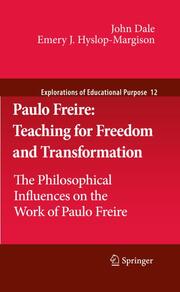Detailansicht
Paulo Freire: Teaching for Freedom and Transformation
The Philosophical Influences on the Work of Paulo Freire, Explorations of Educational Purpose 12
ISBN/EAN: 9789048190997
Umbreit-Nr.: 1721989
Sprache:
Englisch
Umfang: xx, 172 S.
Format in cm:
Einband:
gebundenes Buch
Erschienen am 29.09.2010
Auflage: 1/2011
- Zusatztext
- The primary mission of this text is clarifying many of the misconceptions about Paulo Freire¿s theories, concepts and his implications for education. It revisits his ideas and explains more fully the philosophical influences that shaped concepts such as problem posing, conscientization and praxis. The fundamental thesis, then, is that the present absence of in-depth philosophical analysis leaves an unacceptable void in the literature addressing Freire¿s work, while also promoting frequent misconceptions and superficial understandings about his relationship to contemporary education. Indeed, the philosophical assumptions contributing to Freire¿s critical pedagogy require identification, unravelling and ultimately evaluation on the basis of their epistemic and moral tenability. Most existing applications of Freire¿s pedagogy are unfortunately superficial because they simply sloganize terms such as banking education, conscientization, praxis, and humanization. A slogan in education popularizes a concept or idea in a positive way, but offers very little in terms of critical reflection or analysis. In order to understand these terms and their origin and apply them as Freire intended, a far richer and more in depth examination of Freire is desperately needed. This text will provide precisely that type of examination.
- Kurztext
- A lack of in-depth philosophical analysis has left an unacceptable deficit in the understanding, appreciating and applying of Paulo Freire's work. This lack of analysis promotes frequent misconceptions and creates superficial practice within education. Indeed, the philosophical assumptions contributing to Freire's critical pedagogy require significant intellectual effort to identify, unravel, and ultimately evaluate on the basis of their epistemic, moral and pedagogical tenability. This book generates a far richer and yet more accessible understanding of Freire's theories. It does so because such important ideas, values and attitudes should not suffer from classroom superficiality. Ideas such as banking education, conscientization and humanization are debased when they are reduced to slogans lacking the intellectual support they deserve. In order to understand such terms and their origins more fully, a more in depth examination of Freire's concepts and their philosophical origins is desperately needed. This accessible book provides teachers, students and others with precisely such an examination of Freire's ideas on transformative education.
